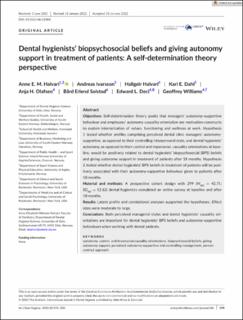| dc.contributor.author | Halvari, Anne Elisabeth M. | |
| dc.contributor.author | Ivarsson, Andreas | |
| dc.contributor.author | Halvari, Halgeir | |
| dc.contributor.author | Dahl, Kari Elisabeth | |
| dc.contributor.author | Olafsen, Anja Hagen | |
| dc.contributor.author | Solstad, Bård Erlend | |
| dc.contributor.author | Deci, Edward | |
| dc.contributor.author | Williams, Geoffrey Colin | |
| dc.date.accessioned | 2022-06-21T09:36:56Z | |
| dc.date.available | 2022-06-21T09:36:56Z | |
| dc.date.created | 2022-02-24T20:40:27Z | |
| dc.date.issued | 2022 | |
| dc.identifier.citation | Halvari, A. E. M., Ivarsson, A., Halvari, H., Dahl, K. E., Olafsen, A. H., Solstad, B. E., Deci, E. L. & Williams, G. (2022). Dental hygienists’ biopsychosocial beliefs and giving autonomy support in treatment of patients: A self-determination theory perspective. International Journal of Dental Hygiene, 20(2), 193-202. | en_US |
| dc.identifier.issn | 1601-5029 | |
| dc.identifier.uri | https://hdl.handle.net/11250/2999772 | |
| dc.description.abstract | Objectives: Self-determination theory posits that managers’ autonomy-supportive behaviour and employees’ autonomy causality orientation are motivation constructs to explain internalization of values, functioning and wellness at work. Hypothesis 1 tested whether profiles comprising perceived dental clinic managers’ autonomy-supportive, as opposed to their controlling interpersonal style, and dental hygienists’ autonomy, as opposed to their control and impersonal, causality orientations at baseline, would be positively related to dental hygienists’ biopsychosocial (BPS) beliefs and giving autonomy support in treatment of patients after 18 months. Hypothesis 2 tested whether dental hygienists’ BPS beliefs in treatment of patients will be positively associated with their autonomy-supportive behaviour given to patients after 18 months.
Material and methods: A prospective cohort design with 299 (Mage = 42.71; SDage = 12.62) dental hygienists completed an online survey at baseline and after 18 months.
Results: Latent profile and correlational analyses supported the hypotheses. Effect sizes were moderate to large.
Conclusions: Both perceived managerial styles and dental hygienists’ causality orientations are important for dental hygienists’ BPS beliefs and autonomy-supportive behaviours when working with dental patients. | en_US |
| dc.language.iso | eng | en_US |
| dc.rights | Attribution-NonCommercial-NoDerivatives 4.0 Internasjonal | * |
| dc.rights.uri | http://creativecommons.org/licenses/by-nc-nd/4.0/deed.no | * |
| dc.title | Dental hygienists’ biopsychosocial beliefs and giving autonomy support in treatment of patients: A self-determination theory perspective | en_US |
| dc.type | Peer reviewed | en_US |
| dc.type | Journal article | en_US |
| dc.description.version | publishedVersion | en_US |
| dc.rights.holder | © 2022 The Authors. | en_US |
| dc.source.pagenumber | 193-202 | en_US |
| dc.source.volume | 20 | en_US |
| dc.source.journal | International Journal of Dental Hygiene | en_US |
| dc.source.issue | 2 | en_US |
| dc.identifier.doi | https://doi.org/10.1111/idh.12584 | |
| dc.identifier.cristin | 2005338 | |
| cristin.ispublished | true | |
| cristin.fulltext | original | |
| cristin.qualitycode | 1 | |

